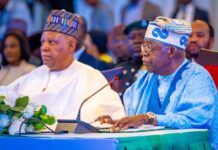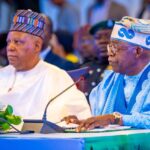- Labour leaders say Gov won’t be liable if LGs default
Kwara State Governor AbdulRahman AbdulRazaq on Thursday said he was hesitant to ink the minimum wage deal with labour because he was not convinced that the local government councils can afford the table that the negotiation panel has proposed.
AbdulRazaq told dozens of labour leaders at a consultation meeting in Ilorin that he was ready to sign the deal if he would not be held responsible if the councils default, observing that the councils are at present struggling to pay the N18,000 minimum wage and even had to draw from their savings and IGR before paying February salary.
The Governor asserted that he stands by and has held to his belief — which dated to his years in the defunct Congress for Progressives Change (CPC) – that local governments should enjoy their autonomy without the state government touching their funds.
“Since we came on board, this administration has not touched a kobo of the LG allocation. This is something all of you can testify to. I stand by this. We have allowed LGs to have control of their money,” he said.
“I want to thank the labour unions for their understanding and patience (on the minimum wage). Yes I do understand that it is dragging but we need to get it right. The fact that it is dragging is why I said we need to hear from you on this matter.
“When we came on board we saw a lot of gaps in salary payment. We saw that N18,000 minimum wage was not fully implemented. And we saw that there were lot of casual workers. For example, we had to pay the teachers of Colleges of Education over N750million arrears of their salary alone. The salaries of primary school teachers of the College of Education in Ilorin were not paid for 30 months.
“Now moving forward with the new minimum wage, we do not want a repeat of that situation; we want everybody to get their salaries as and when due. We found out that the local governments cannot pay the scale which we are looking at and ready to sign. The understanding is that the state and local government must pay on the same template/scale. If it is about going ahead and signing what is popular, I can sign today. But it is a choice between signing or doing what is popular and what is right or practicable. I can sign a popular deal today with the unions but by January next year, the local governments would be owing their staff close to N8billion. Then that is when the major strike will come in. This is something I really do not want. We therefore need to mitigate the situation and find a lasting solution to what we are doing.
“For example, the local governments struggled to pay the salary for January and February. What came in from Abuja could not pay their salaries. When I contested in 2011 under the platform of CPC, part of my manifesto was that we must abolish this issue of state government running the account of local government, and I am glad that when we came in the federal government insisted that all monies to local governments must go to them. And since we came in that is what has been happening. Nobody has touched local governments’ monies. We didn’t give it to them and went back to take the money away from them. So they have their money to spend and they have been making savings (when they had surplus) and the savings simply came from the fact that the DPMs have a spending limit. So it is with these savings and their IGR that they were able to augment the shortfall in their salaries in January and February. The salary we are talking about is the N18,000 minimum wage. So if they are struggling to pay N18,000 minimum wage, how do they pay N30,000 minimum wage? That is a big challenge to us. The other big challenge is that we can see the way the global economy is. Our budget had been predicated on $57 per barrel but oil is now below $35 per barrel.”
AbdulRazaq said while he believes in the minimum wage, he insisted he was not convinced that the local government can afford the proposed template and that he was wary of people blaming him if the councils default on salary payment.
He said he would not want a return to an era when local councils were paying 40 percent of workers’ salaries, adding: “We don’t want to be remembered for paying such. We don’t want to pay half salary. That is why we want to sign what the local councils can pay.”
But the workers’ unions unanimously urged him to ink the deal and leave the local government authorities to draw up the modalities to pay, including working with the government to weed out ghost workers, cleanse the payroll, and reduce the wage bill.
“Right in this hall, Your Excellency, workers of local government are telling you that let us sign this deal. Whatever is payable at the local government will be it in as much as the autonomy is there and it is our money. We will accept. It has been done before. Nobody is going to blame you for anything. Nobody is going to pack up arrears on your head. Nobody is going to tell you that you are indebted to us for this. But it is for them (workers) to see the right salary which they are asking for after a thorough screening. You will be surprised that we will meet up by God’s grace. We are for you. We won’t undermine your administration,” Kolawole Olumo, chairman of the Trade Union Congress (TUC), told the Governor at the meeting.
Olumo said the local councils would be able to pay if proper staff auditing is done and the unions are involved in the exercise.
Chairman of the Joint Negotiation Council of the labour union Saliu Suleiman and NULGE President Yusuf Ayinla Salihu restated the same line, urging the Governor to sign the deal while thorough screening is done to cleanse the payroll.
Head of Service Susan Modupe Oluwole commended the Governor for again meeting with the labour leaders, adding: “We are quick to sign (agreements like this) and then everyone goes away from the table and the problem becomes that of those saddled with the responsibility of the payment. Now we are here. There is an attendance sheet going round. We are supposed to write and sign for records that we were here on a day like this and we all decided together that at any point in time, since the state is no longer taking anything from the local government, when the resources come in and it cannot pay, it is not the problem of the state. This is what we agreed. We are all going to sign, we are all going to write a resolution and put it on record so that we have a record of a day like this. This is just for the day of reckoning so that we can all refer to it.”



















